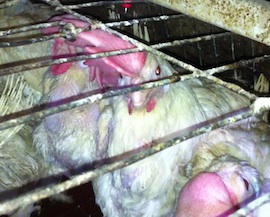
April 20 Update: Due to unforeseen circumstances, Sunday’s “Vegan Day” at Bread & Brew has unfortunately been cancelled. However, stop by ANY day during VegWeek to order anything off their vegan menu and 20% of your bill will still be donated to COK’s work for farmed animals!
While a growing number of restaurants are eager to tout more sustainable business practices, such as serving local foods or buying organic produce, perhaps the most important step that businesses can take to demonstrate their commitment to helping protect the planet is simply offering meat-, egg-, and dairy-free meals.




 Easter is a celebration of life –and what better way to honor this holiday than by choosing animal-friendly foods and activities that everyone can enjoy?
Easter is a celebration of life –and what better way to honor this holiday than by choosing animal-friendly foods and activities that everyone can enjoy? 